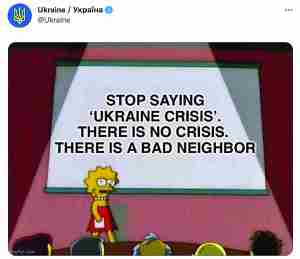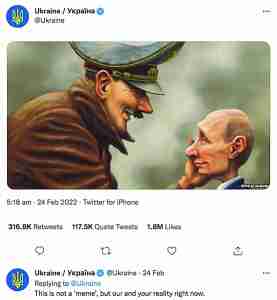Are memes the new political cartoon? How we discuss serious issues online
Internet memes started off as simple, formulaic jokes; a two-liner superimposed on an image of a grumpy cat, an angry baby, a high-school nerd etc. There was a premise and a formula followed with each one, and they had about as much underlying meaning behind them as the jokes you find in a Christmas cracker.
Nowadays however, with the internet having become an immovable facet in our daily lives, the formulaic two-liner memes of the early 2010’s are an almost unrecognisable origin to the modern meme. Not only are memes much less formulaic now, ranging between being an image, a running linguistic joke, a TikTok trend etc, but the topics they delve into have also evolved significantly. People make memes about everything from television shows to societal issues, from pop culture to mental health struggles – and in many ways, this evolution isn’t entirely surprising.
 Especially with the impact of the pandemic and the subsequent increase in time spent online, more and more of our discussions and debates are taking place on the internet. And since meme culture has cemented itself as a popular form of communicating information – be that in a light-hearted or genuine (albeit often satirical) way – the use of memes to comment on more serious topics is an understandable development.
Especially with the impact of the pandemic and the subsequent increase in time spent online, more and more of our discussions and debates are taking place on the internet. And since meme culture has cemented itself as a popular form of communicating information – be that in a light-hearted or genuine (albeit often satirical) way – the use of memes to comment on more serious topics is an understandable development.
In many ways, memes no longer function just as jokes, but can also be used to provide subtle commentary on a subject, much in the same way political cartoons have done for centuries. We’ve seen this a lot in the past few years, with memes about Covid, Trump, the cost of living etc. populating online spaces, but perhaps some of the most striking recent examples of memes functioning as political commentary have come out of the Ukrainian twitter account.
Mere hours before the Russian invasion of Ukraine began on Thursday last, the official Ukrainian twitter account posted a caricature of an oversized Adolf Hitler smiling down proudly at Vladimir Putin, with his hand placed on Putin’s cheek. Given the international focus on both countries at the moment, the image quickly garnered a lot of attention, and many people expressed their confusion as to why Ukraine was posting with such a seemingly sarcastic tone. A few hours later, Ukraine clarified with a response to the tweet, saying, “This is not a meme, this is our and your reality right now”.
While Thursday’s image was quite akin to a traditional political cartoon, this is far from the only time Ukraine’s twitter has posted about the situation using the meme format. Last month, they posted a Lisa Simpson meme that read, “Stop saying ‘Ukraine crisis’. There is no crisis. There is bad neighbour”, and as recently as this Tuesday, they posted a meme comparing Putin unfavourably to Volodymyr Zelensky.
What the Ukrainian twitter account seems to have recognised is that the accessibility of memes lends an opportunity to reach the masses. It’s worth noting that people’s surprise over Ukraine posting satirical memes has boosted their online engagement, pushing even more people to follow their account, which also posts a steady stream of information about the ongoing crisis. So, not only is the underlying messages in the memes they post getting across, but more and more people are being directed towards their account and the other, more serious-toned things they’re posting.
Of course the internet is the internet, and while Ukraine’s official twitter is a good example of memes being used to provide political commentary with a clear message behind it, there have also been a lot of memes about the crisis that were in incredibly poor taste. Of course, it’s difficult to not become a bit disillusioned with the reality of things when there is a constant negative news cycle being bombarded at you from your phone screen. However, the past couple of days have not been without their fair share of memes circulating that only served to trivialise the ongoing crisis, as has been seen with other crises before it. There is a thin line between satire and invalidating a serious issue, and depending on what side of the internet you’re on, you can come across either one.
It’s easy to understand why memes aren’t taken as seriously as the likes of political cartoons and other forms of satirical comment. The most popular examples over the years have usually been quite trivial and sarcastic in nature, and even the word ‘meme’ reads as sort of silly. At the same time though, it’s undeniable that the culture around memes and what we discuss through memes has evolved way beyond its roots as simple jokes. Whether or not you think a degree of sincerity is lost when serious issues are depicted in memes, there’s an argument to be made that even if that is so, they are capable of being powerful tools in the big discussions that happen online. Hopefully, the ones with a grounded point behind them are the ones that continue to make waves.






